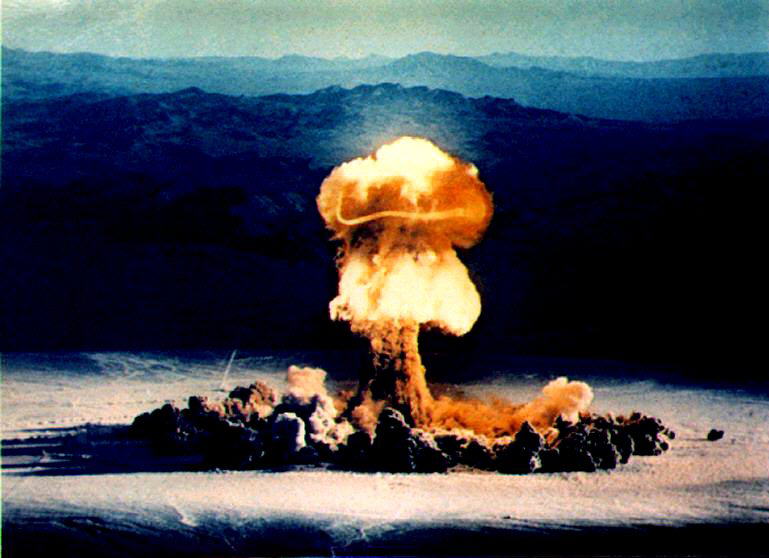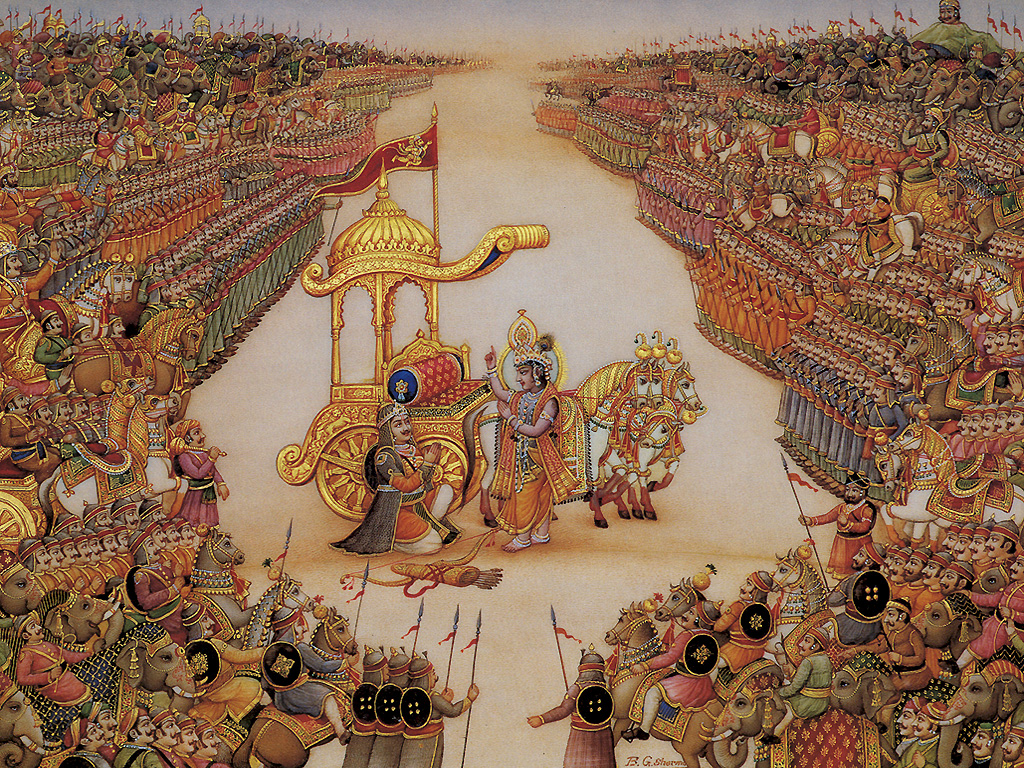 There's a famous (and true: see video) story about the moment the first atom bomb was tested, in the deserts of the American West. As Robert Oppenheimer, the scientist dubbed the father of the bomb, watched the first mushroom cloud appear on the horizon, the full horror of his own accomplishments struck him, and he was moved to recite the words of Krishna from the Bhagavad Gita:
There's a famous (and true: see video) story about the moment the first atom bomb was tested, in the deserts of the American West. As Robert Oppenheimer, the scientist dubbed the father of the bomb, watched the first mushroom cloud appear on the horizon, the full horror of his own accomplishments struck him, and he was moved to recite the words of Krishna from the Bhagavad Gita:I am become death, the destroyer of worlds.
***
I remembered this as I was reading the Bhagavad Gita recently, because I couldn't find these words in my translation. The verse Oppenheimer had in mind was 11:32, which Juan Mascaro (The Bhagavad Gita, transl. Juan Mascaro, Penguin Books, 1962 1st edition) gave instead as follows:
I am all-powerful Time which destroys all things.
***
I was annoyed by two things about the translation Oppenheimer used.
 Firstly, and the minor detail, was the grammar. There appears to be no reason to use the grammatically incorrect 'I am become', when the correct wording would have been 'I am' or 'I have become', and which could have been used. It appeared to be a case of translating something incorrectly to make it sound more exotic and foreign - as Edward Said may have noted in Orientalism (I can't remember where I read it, and I can't think where else it might have been. Rushdie?), there seemed a touch of suggestion that here was something so strange and foreign and absurd, that it could not even be translated correctly and sensibly.
Firstly, and the minor detail, was the grammar. There appears to be no reason to use the grammatically incorrect 'I am become', when the correct wording would have been 'I am' or 'I have become', and which could have been used. It appeared to be a case of translating something incorrectly to make it sound more exotic and foreign - as Edward Said may have noted in Orientalism (I can't remember where I read it, and I can't think where else it might have been. Rushdie?), there seemed a touch of suggestion that here was something so strange and foreign and absurd, that it could not even be translated correctly and sensibly.Secondly, and the major issue, was the very fundamental one of what the original verse said. To say One is Death has far more sinister overtones than saying One is Time, and certainly while Time is in a way Death - as a character in Fight Club says, On a long enough time line, the survival rate for everyone drops to zero - there is a huge difference in idea, intent, and meaning. Was Krishna simply saying he was Time, and Oppenheimer misinterpreting it to Death? Was the most popular quote from the Gita in the western world actually a mistranslation?
I decided to look into this further.
***
The relevant line in the original sanskrit is as follows:
kalo 'smi loka-ksaya-krt
(source:http://www.asitis.com/11/32.html)
As I had no issue with 'the destroyer of worlds' = 'which destroys all things', I was only concerned with the first half of the line: kalo'smi. This could be translated as I am 'Kalo'. So what did 'Kalo' in this context refer to? Death or Time?
I decided to see if others had considered this matter. They had indeed, and in some detail. There was a paper called 'The Gita of J. Robert Oppenheimer' by James Hijiya, Professor of History at the University of Massachusetts, which explained that Oppenheimer was significantly influenced by Arthur Ryder (a Sanskrit scholar who had taught Oppenheimer), whose translation of the Gita used Death instead of Time. I have reproduced footnote 50 of his paper in full:
"Ryder’s translation here is a little peculiar but defensible. Ever since the first rendering of the Sanskrit text into English in 1785, most experts have translated this word not as Death but as Time. Cf. Charles Wilkens, The Bhagvat-Geeta (London: C. Nourse, 1785; Gainesville, Fla.: Scholars’ Facsimiles & Reprints, 1959), 93; Besant, Bhagavad-Gita, 116; Prabhavananda and Isherwood, Bhagavad-Gita, 123; S. Radhakrishnan, The Bhagavadgita (New York: Harper & Brothers, 1948), 279; Eknath Easwaran, The Bhagavad Gita (Petaluma, Calif.: Nilgiri Press, 1985), 154; Barbara Stoler Miller, The Bhagavad-Gita (New York: Columbia University, 1986), 103; Dominic Goodall, Hindu Scriptures (Berkeley: University of California, 1996), 260.
 There are, however, exceptions. Franklin Edgerton, The Bhagavad Gita (Cambridge: Harvard University, 1944), 58, renders the word as “Time (Death).” Miller, Bhagavad-Gita, 103, translates the word in question and a following phrase as “time grown old”; Radhakrishnan, Bhagavadgita, 279, as “time . . . grown mature.” The passage of a vast expanse of time implies death, thus making “Death” a legitimate translation. In his rendering of the passage, Oppenheimer followed his teacher, Ryder. This variant was especially appropriate for describing a nuclear explosion, which could bring a great deal of Death in very little Time."
There are, however, exceptions. Franklin Edgerton, The Bhagavad Gita (Cambridge: Harvard University, 1944), 58, renders the word as “Time (Death).” Miller, Bhagavad-Gita, 103, translates the word in question and a following phrase as “time grown old”; Radhakrishnan, Bhagavadgita, 279, as “time . . . grown mature.” The passage of a vast expanse of time implies death, thus making “Death” a legitimate translation. In his rendering of the passage, Oppenheimer followed his teacher, Ryder. This variant was especially appropriate for describing a nuclear explosion, which could bring a great deal of Death in very little Time."***
 The footnote answered most of my questions, but I would like to note the following:
The footnote answered most of my questions, but I would like to note the following:The reasons for the difficulty are obvious for the Hindustani speaker just by looking at words in contemporary usage with the K-L consonant sounds. There are words like Kal, Kaal, Kala, which we associate with concepts of time, but there is also the goddess associated with death, Kali.
***
But one can in this instance also look within the Gita to see other instances where concepts of Time or Death are mentioned, and consider the vocabulary employed for them. I am more familiar with Adhyayas (Cantos) 1 and 2, where in 1:1, Sama is used for Time, and where in 2:37, Hato is used for Death. Unhelpfully, Kal is used for neither situation. It is used elsewhere in the book, including Adhyaya 11, but I did not have, well, the time(!) for a thorough review, and decided against an incomplete one.
***
In summary, we wondered whether Oppenheimer wasn't misquoting the Gita. We laid out the reason for our wondering thus, and then found that someone had already done a lot of research on the topic, which revealed that most translators thought so, but there was a minority in support. Since we are libertarians and see no harm in minorities taking divergent opinions where there is no harm to others, I will not be criticizing Mr Oppenheimer's choice of translation, though I do not think I agree with it.
